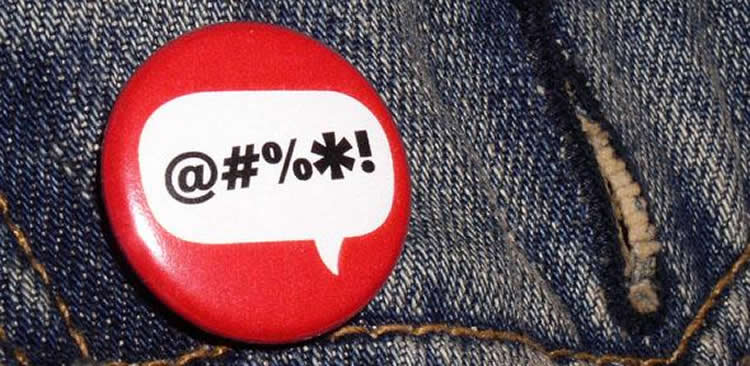Summary: A new study reports people who use profanities tend to be more honest and are less likely to be associated with deception or lying.
Source: University of Cambridge.
It’s long been associated with anger and coarseness but profanity can have another, more positive connotation. Psychologists have learned that people who frequently curse are being more honest. Writing in the journal Social Psychological and Personality Science a team of researchers from the Netherlands, the UK, the USA and Hong Kong report that people who use profanity are less likely to be associated with lying and deception.
Profanity is obscene language which, in some social settings is considered inappropriate and unacceptable. It often refers to language that contains sexual references, blasphemy or other vulgar terms. It’s usually related to the expression of emotions such as anger, frustration or surprise. But profanity can also be used to entertain and win over audiences.
There are conflicting attitudes to profanity and its social impact has changed over the decades. In 1939, Clark Gable uttering the memorable line “Frankly my dear, I don’t give a damn” in the film Gone with the Wind, was enough to land the producers a $5,000 fine. Nowadays our movies, TV shows and books are peppered with profane words and, for the most part, we are more tolerant of them.
As dishonesty and profanity are both considered deviant they are often viewed as evidence of low moral standards. On the other hand, profanity can be positively associated with honesty. It is often used to express unfiltered feelings and sincerity. The researchers cite the example of President-elect Donald Trump who used swear words in some of his speeches while campaigning in last year’s US election and was considered, by some, to be more genuine than his rivals.
Dr David Stillwell, a lecturer in Big Data Analytics at the University of Cambridge, and a co-author on the paper, says: “The relationship between profanity and dishonesty is a tricky one. Swearing is often inappropriate but it can also be evidence that someone is telling you their honest opinion. Just as they aren’t filtering their language to be more palatable, they’re also not filtering their views. ”

The international team of researchers set out to gauge people’s views about this sort of language in a series of questionnaires which included interactions with social media users.
In the first questionnaire 276 participants were asked to list their most commonly used and favourite swear words. They were also asked to rate their reasons for using these words and then took part in a lie test to determine whether they were being truthful or simply responding in the way they thought was socially acceptable. Those who wrote down a higher number of curse words were less likely to be lying.
A second survey involved collecting data from 75,000 Facebook users to measure their use of swear words in their online social interactions. The research found that those who used more profanity were also more likely to use language patterns that have been shown in previous research to be related to honesty, such as using pronouns like “I” and “me”. The Facebook users were recruited from across the United States and their responses highlight the differing views to profanity that exist between different geographical areas. For example, those in the north-eastern states (such as Connecticut, Delaware, New Jersey and New York) were more likely to swear whereas people were less likely to in the southern states (South Carolina, Arkansas, Tennessee and Mississippi).
Source: Paul Seagrove – University of Cambridge
Image Source: NeuroscienceNews.com image is adapted from the University of Cambridge press release.
Video Source: Gone With The Wind clip courtesy of MGM/Selznick International Pictures.
Original Research: Full open access research for “Frankly, We Do Give a Damn: The Relationship Between Profanity and Honesty” by Gilad Feldman, Huiwen Lian, Michal Kosinski, and David Stillwell in Social Psychological and Personality Science. Published online January 15 2017 doi:10.1177/1948550616681055
[cbtabs][cbtab title=”MLA”]University of Cambridge “Frankly, Do We Give a Damn? Study Finds Link Between Profanity and Honesty.” NeuroscienceNews. NeuroscienceNews, 16 January 2017.
<https://neurosciencenews.com/profanity-honesty-psychology-5944/>.[/cbtab][cbtab title=”APA”]University of Cambridge (2017, January 16). Frankly, Do We Give a Damn? Study Finds Link Between Profanity and Honesty. NeuroscienceNew. Retrieved January 16, 2017 from https://neurosciencenews.com/profanity-honesty-psychology-5944/[/cbtab][cbtab title=”Chicago”]University of Cambridge “Frankly, Do We Give a Damn? Study Finds Link Between Profanity and Honesty.” https://neurosciencenews.com/profanity-honesty-psychology-5944/ (accessed January 16, 2017).[/cbtab][/cbtabs]
Abstract
Frankly, We Do Give a Damn: The Relationship Between Profanity and Honesty
There are two conflicting perspectives regarding the relationship between profanity and dishonesty. These two forms of norm-violating behavior share common causes and are often considered to be positively related. On the other hand, however, profanity is often used to express one’s genuine feelings and could therefore be negatively related to dishonesty. In three studies, we explored the relationship between profanity and honesty. We examined profanity and honesty first with profanity behavior and lying on a scale in the lab (Study 1; N = 276), then with a linguistic analysis of real-life social interactions on Facebook (Study 2; N = 73,789), and finally with profanity and integrity indexes for the aggregate level of U.S. states (Study 3; N = 50 states). We found a consistent positive relationship between profanity and honesty; profanity was associated with less lying and deception at the individual level and with higher integrity at the society level.
“Frankly, We Do Give a Damn: The Relationship Between Profanity and Honesty” by Gilad Feldman, Huiwen Lian, Michal Kosinski, and David Stillwell in Social Psychological and Personality Science. Published online January 15 2017 doi:10.1177/1948550616681055






